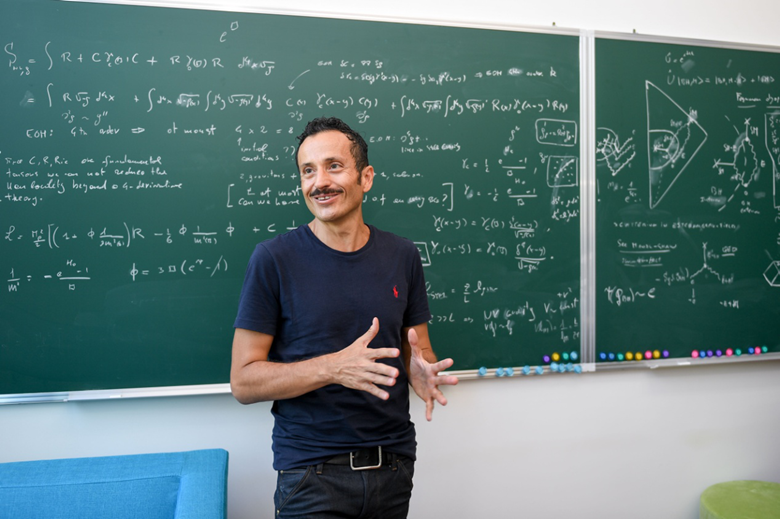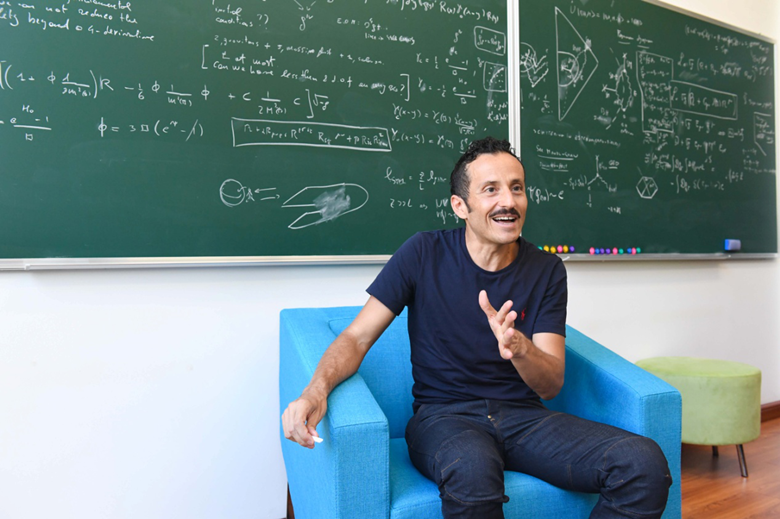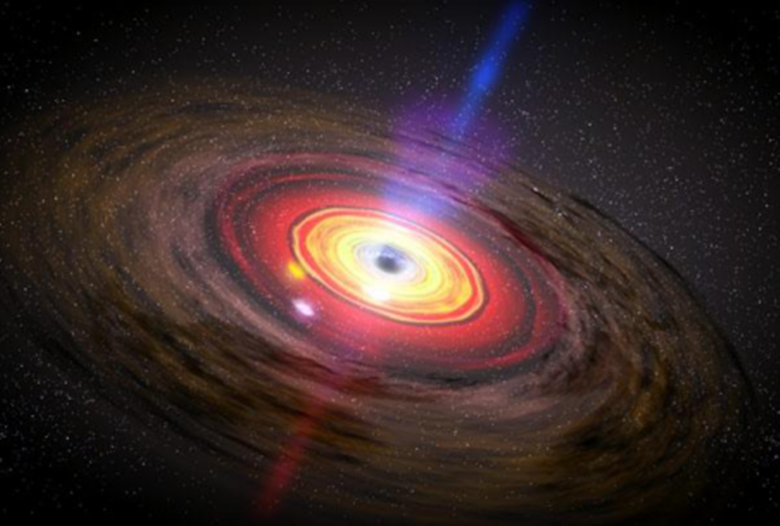Researchers make breakthrough in magnetic geometry-induced quantum geometry and nonlinear transport
2025-06-06SUSTech hosts IOP Forum with President of Institute of Physics Sir Keith Burnett
2025-03-26Researchers discover unusual thermal conductivity in high-symmetry single crystals
2025-03-26New efficient method detects quantum temporal correlations
2025-03-26Researchers explore unconventional magnons predicted by spin space groups
2025-03-25Associate Professor Leonardo Modesto joined SUSTech’s Physics Department in late 2016. His areas of research include cosmology, particle physics and quantum gravity and he has made significant contributions to his field throughout his academic career which took him across multiple continents.

- Can you tell us about your academic and professional background? Where did you study, work, research and teach before?
I studied in Pisa, Galileo Galilei’s city, and I got my PhD in Physics in Turin, in the north of Italy, working in String Theory with Prof. Pietro Fre'. Afterwards, I moved to Marseille, in France, where I became a "physicist” working with Carlo Rovelli, the leader of one of the main approaches to quantum gravity, namely: Loop Quantum Gravity. After two years I got a postdoc offer at Perimeter Institute in Waterloo, Canada. There, I had the opportunity to meet great physicists like Lee Smolin, Robert Myer, Robert Mann, Rafael Sorkin, N. Turok, and many others. Afterwards, I got a Professor position at the Fudan University in Shanghai before finally moving to SUSTech.
- What was your most memorable moment during your academic and research career?
I would like to mention two moments. The first one is when I discovered that in the Smolin-Rovelli’s quantum gravity theory it is possible to remove the black singularity.
The outcome was a new universe inside the back hole that is dual to our universe.
The second one is when I discovered a gravitational theory beyond Einstein’s gravity with good properties at quantum level. For experts, this theory is free of ghosts and finite at quantum level. For many years we were told that it was not possible to solve the problems of gravity in the quantum field theory framework. Well, we proved that we could achieve this result and it is my intention to make SUSTech the leader in this research field.
- What made you want to come to work in China? How about Shenzhen? And SUSTech?
China is a developing country, and it is investing a lot of money in research. It offers the opportunity for scientists to freely do very high-level research.
I moved to Shenzhen just a few months ago because it harbored all these promises. Besides, I can already see that this is a very nice city, although the summer is very hot, winter and rest of the year is very pleasant. The air quality is very good and SUSTech has an amazing campus in the middle of nature, very close to natural reserves and the golf fields. The campus is also close to the downtown and is surrounded by hills from which you can get a magnificent view of the city.
- Can you introduce your Department of Physics, and the role it plays here in Shenzhen.
The Physics Department is an excellent place with extraordinary scientists working in condensed matter at both theoretical and experimental level.
They just started the construction of a quantum computer and/or a quantum simulator (Prof. Dapeng Yu, Prof. Man Hong Yung, Yuanzhen Chen), a topic that excites me a lot. With this kind of machine we hope to be able to solve numerical problems that would otherwise require hundreds of years. Other people work on Bose-Einstein condensation, Graphene physics (Prof. Fei Ye, Prof. Liyuan Zhang), Superconductors (Prof. Weiqiang Chen).
The group around Prof. He works on thermoelectrical properties of materials. This connected with the energy industry in Shenzhen.

"With this kind of [quantum simulator] we hope to be able to solve numerical problems that
would otherwise require hundreds of years."
- How do you make physics exciting for your students? What would you say to students who are thinking of studying physics?
I can tell you why I decided to do physics and why I am still doing physics. Physics is not just a job. It is a mission, and the main reason I am doing research is because I would like to understand the mysteries of the universe at microscopic and macroscopic level, from the Big-Bang to what's inside a black hole.
However, my real dream when I was a child was to travel at the edge of the universe. This is the real reason why I studied physics and it’s still my final goal, with a hint of arrogance. During my lectures I try to make practical examples often at the border with science fiction. With exercises on black holes, wormholes, time machines, I am sure I can help motivate the students to tackle and study a difficult topic like general relativity.
- Can you tell us what is it that you do in your research lab, in words that non-academic people can understand? For example can you give us a simple introduction on your research on black holes?
My research topic is gravitational physics and I mainly concentrate on two topics. The first one is more theoretical and about the quantization of gravity. As I mention before I, with my collaborates, postdocs and scientists around the world, formulated a new theory of gravity with good properties at quantum level, and we are trying to understand what are potential implications and applications of the theory.
The second one is about the fate of an observer when he/she jumps inside of a black. Does he/she reaches the centre of the black hole? We recently discovered that the black hole interior is like another Universe and nothing and/or nobody can reach the centre of the black hole.
- Can you explain to us in very basic terms what kind of impacts new physics research could have on our daily lives in the near future? What is the next big thing in physics?
I am a theoretical physicist and I am more interested in understanding nature, not in applied physics. However, we have experienced in the past that everything initially only has theoretical implications in the everyday life. You can think of Maxwell's equations for the electromagnetic interactions and the countless number of applications in our life: mobile telephones, electric engines, home appliances, etc. You can think that in the future we will have a telephone using gravitational waves instead of electromagnetic waves, or spacecrafts traveling faster than light, etc.

- How do you feel about being a life-tutor at the residential college here?
In the last semester I taught general relativity, and I was really impressed by the level of students. I have a student working with me now, and I will be happy to have more in the future. It is only collaborating with other people and in particular young and curious students that we can make a big step forward. Passion is alive in young people and passion is the most important feature of a good scientist.
- Does your research often bring you to work with other scientists in different disciplines than yours? How easy/difficult is it to collaborate with researchers from different fields?
In the past I have collaborated with people involved in different topics, but always in Physics and not that far from my topic. However, I can not exclude to collaborate with Mathematicians in the next future because of interesting topics that came out recently. Moreover, it should be great to collaborate with engineers or Biologists, and/or the military department. I can not exclude, at least on my side, this kind of collaborations. Finally, recently with Prof. Man Hong we decided to hire a postdoc working in between gravity and quantum information.
- Do you miss anything from your home place, and did you have any difficulties adjusting to life in China when you first arrived?
Basically, I do not miss anything, but I am here in China with my wife and my three-year-old twins, and sometimes we feel alone far away from our parents, friends, and relatives. We must face every problem without any help at all in the everyday life. Everything for us has a cost.
- If you had a message for the physics community around the world, what would it be?
Don’t think about career, only search for the truth. Truth is independent from schools or prestigious positions. Search for the truth always.